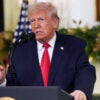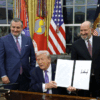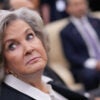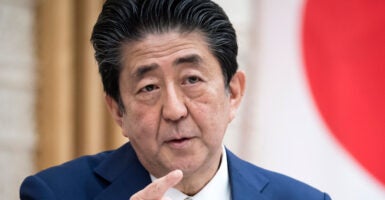Former Japanese Prime Minister Shinzo Abe was fatally shot Friday at a campaign rally ahead of Japan’s elections Sunday for the upper house of its parliament.
The event has shocked Japan, which has extremely tight gun control laws and one of the world’s lowest rates of gun violence.
Abe, who was 67, was a towering political figure in Japan and remained highly influential after leaving the prime ministership in 2020. Japan maintained Abe’s pragmatic foreign and security policies and will remain a stalwart U.S. ally in addressing the Chinese and North Korean threats.
Abe suffered two gunshot wounds while giving a campaign speech for a candidate in Japan’s House of Councilors elections and subsequently died at a hospital.
A Japanese assailant was taken into custody by police. Initial reports indicated the weapon was a shotgun, but photos taken at the scene suggest the weapon may have been homemade.
The assailant reportedly told police he was dissatisfied with Abe, but didn’t hold a grudge against his political beliefs. Police also discovered several possible explosive devices at his home.
Strict Gun Control
In 2021, Japan, with a population of 125 million, had just one gun-related death. Only shotguns and air rifles can be purchased under its stringent gun control laws, but not rifles or handguns.
Potential gun owners have to attend an all-day class, pass a written test, have a mental health evaluation at a hospital, and have a criminal background check and family interviews by policy. Guns must be stored in a wall-affixed locker with three locks and with ammunition stored separately. When a gun owner dies, their relatives must surrender the firearms.
Abe’s Impressive Legacy
While prime minister, Abe implemented a visionary foreign policy, strengthened Japan’s alliance with the United States, and was decisive on regional security threats. Abe’s successors continued his policies, and he remained an active member and faction leader within the Diet, Japan’s national legislature.
He served as Japan’s youngest postwar prime minister in 2006-2007 and again from 2012 to 2020 as Japan’s longest-serving leader. Both times he resigned due to health issues arising from ulcerative colitis.
His political longevity during his second tenure enabled stability, policy coherence, and consistency, which in turn enabled Japan to play a more prominent and assertive role in the region and on the world stage.
Abe created a grand strategy for Japan, including setting the intellectual foundations for the Free and Open Indo-Pacific region and the Quadrilateral Security Dialogue, a strategic forum among Japan, Australia, India, and the United States. Both concepts were embraced and adapted to the United States’ strategy.
Abe also elevated diplomatic, economic, and security ties with Southeast Asian nations, Australia, France, India, and the United Kingdom through a series of agreements and, in some cases, combined military exercises.
Abe also had a significant impact on Japan’s security posture. Among other accomplishments, he instituted Japan’s first National Security Council and National Security Strategy, increased Japan’s defense budget, implemented changes to augment defenses against China’s increasing territorial incursions, and overcame significant domestic resistance to enable Japan to play a large regional and global security role by exercising collective self-defense.
He implemented ambitious policies, referred to as “Abenomics,” to jump-start the Japanese economy after decades of sluggish growth.
A three-pronged approach, Abenomics combined increased infrastructure spending, loose monetary policy, and structural reforms. After the U.S. withdrawal from the Trans-Pacific Partnership, Abe became a leader of the trade deal negotiations, eventually creating the Comprehensive and Progressive Agreement for Trans-Pacific Partnership.
Abe also negotiated trade deals with the European Union, the United States, and the United Kingdom.
What’s Next?
Some will speculate that Abe’s assassination marks a return to Japan’s tumultuous past of political violence of the 1960s and the prewar era. But Japan is quite different today, and the political landscape will likely remain stable. Prime Minister Fumio Kishida announced that the upper house elections will take place with enhanced security.
The tragic event has stunned Japan, but won’t alter its foreign and security policies. Kishida affirmed Japan’s realist foreign and security policies during President Joe Biden’s visit to Tokyo in May and the first trilateral meeting of U.S., South Korea, and Japanese leaders in nearly five years last month.
Kishida has declared an intent to broaden Japan’s security responsibilities in the Indo-Pacific. In recent years, Tokyo has augmented its military capabilities and steadily increased security cooperation and military exercises with Australia and other regional partners, as well as with France and the United Kingdom.
Kishida advocates Japan increasing its defense budget, potentially toward doubling defense spending to 2% of Japan’s gross domestic product, as well as developing retaliatory strike capabilities against Chinese and North Korean attacks.
Tokyo is increasingly concerned about a potential Chinese attack on Taiwan and has been studying possible military responses, including protecting U.S. warships and military planes coming to Taiwan’s defense.
Have an opinion about this article? To sound off, please email [email protected] and we’ll consider publishing your edited remarks in our regular “We Hear You” feature. Remember to include the url or headline of the article plus your name and town and/or state.
































One Reply to “Killing of Former Prime Minister Shocks Japan, but Shinzo Abe’s Legacy Lives On”